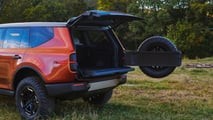Enthusiasm is surging for Scout Motors’ upcoming electric vehicles, and a significant detail is emerging from early reservation data: the “Harvester” extended-range electric vehicle (EREV) system is proving to be exceptionally popular. It appears that a large majority of prospective buyers are leaning towards this innovative powertrain option for both the Scout Traveler SUV and Terra pickup truck. This trend highlights a strong consumer interest in bridging the gap between traditional gasoline vehicles and the all-electric future.
Harvester EREV Captures Majority of Scout Reservations
Data compiled from a crowdsourced reservation tracker on the Scout EV Forum reveals compelling insights into early adopter preferences. An impressive 81% of reservation holders who have shared their order details are opting for the “Harvester” EREV configuration. This strong preference underscores the appeal of a powertrain that offers both electric driving and the reassurance of extended range, addressing a key concern for many potential EV buyers.
The term “Harvester” is a nod to Scout’s heritage, referencing International Harvester, the original manufacturer of Scout off-road vehicles from 1961 to 1980. This name is now applied to Scout’s innovative EREV system. In this setup, a gasoline engine and fuel tank work in tandem with a generator to replenish the battery, which in turn powers the electric motors driving the wheels.
As of recent reports from the Scout EV Forum, over 600 individuals have placed reservations for Scout EREVs. Among these reservations, approximately 58% are for the Traveler SUV, 34.5% for the Terra truck, and 7.7% for reservations encompassing both models. Powertrain preference further emphasizes the Harvester’s popularity, with 81% choosing the EREV system and only 19% opting for a fully electric powertrain. Interestingly, over half of these early reservation holders (52.5%) are not current EV owners, suggesting Scout is attracting a broader audience beyond existing EV enthusiasts.
Scout Motors has acknowledged this strong initial response. A company spokesperson confirmed the positive reception following the vehicle reveals, stating, “Consumer response to the reveal of the Scout Traveler SUV and Scout Terra truck is extremely positive, validating what we learned from the Scout community and several consumer product clinics at which we tested various product concepts.” The spokesperson further noted that reservation volumes have exceeded internal projections, with two-thirds for the Traveler SUV and one-third for the Terra truck. The popularity of the Harvester system, along with features like the bench seat and a focus on utility, is clearly resonating with consumers, as reflected in these reservation numbers.
Understanding the Scout Harvester EREV System
The strong interest in the Harvester system prompts a closer look at what EREVs offer. While currently not prevalent in the US market (with the Chevy Volt being a notable past example), several automakers are now exploring this technology. The upcoming Ram 1500 Ramcharger is a prominent example, and Hyundai has also announced plans for an EREV model later this decade.
EREVs function primarily as electric vehicles. They are driven by electric motors and offer the benefits of electric driving, but with a crucial difference: an onboard engine acts as a generator. When the battery charge depletes, this engine activates to power a generator, which in turn recharges the battery and sustains electric driving. This approach may seem unconventional at first glance – why have a gasoline engine in an electric car? However, the nuances of EREV technology offer compelling advantages.
Unlike traditional combustion engines that operate across a wide range of efficiency levels, EREV engines are designed to run at their peak efficiency, specifically to generate electricity. Furthermore, EREVs can be plugged in and charged like conventional EVs, allowing for primarily electric operation in daily driving. The gasoline engine serves as a backup, ideal for longer journeys, towing, or hauling heavy loads where range and charging infrastructure might be concerns. This makes the Harvester system particularly appealing to buyers who require both electric driving capabilities and the flexibility of extended range without the anxieties associated with purely battery-electric vehicles.
Scout’s Appeal to Traditional SUV and Truck Buyers
The reservation data suggests that Scout’s design and technology are effectively capturing the attention of traditional SUV and truck owners. The forum data indicates that many individuals currently driving Ford Broncos and Jeep Wranglers – vehicles known for their off-road capability and rugged appeal – have placed reservations for the Scout Traveler SUV. This crossover appeal is significant, indicating that Scout Motors is not just attracting EV converts but also drawing in customers from established segments of the automotive market.
With production slated to begin at a new $2 billion facility in South Carolina by 2027, and a target starting price under $60,000 before incentives, taxes, and fees, Scout Motors is positioning itself to be a significant player in the electric vehicle landscape. The early enthusiasm for the Harvester EREV system, combined with the retro-modern design and focus on utility, suggests that Scout is hitting a sweet spot with consumers seeking a blend of electric innovation and traditional automotive values.
Updated Reservation Insights (October 29):
Recent updates from the Scout Motors forum provide further breakdown of reservation trends:
- Powertrain Choice:
- Harvester EREV: 80.6%
- Full-Electric: 19.4%
- Model Preference:
- Traveler SUV: 59.8%
- Terra Pickup: 32.7%
- Both: 7.5%
- Roof Type Preference:
- Steel: 24.4%
- Cabana: 20.7%
- Glass: 17.7%
- Undecided: 37.2%
- Front Bench Seat Option:
- Yes: 30.7%
- No: 45.4%
- Undecided: 23.9%
- Heavy-Duty Winch Option:
- Yes: 25.9%
- No: 46.2%
- Undecided: 27.8%
- Previous/Current EV Ownership:
- Yes: 30.7%
- No: 45.4%
These updated statistics reinforce the initial trends, solidifying the Harvester EREV as the clear favorite and providing deeper insights into feature preferences among early Scout adopters. The strong reservation numbers and the pronounced preference for the Harvester system indicate a promising start for Scout Motors as they prepare to enter the EV market.
